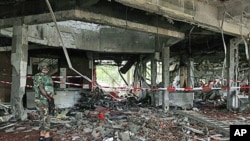Nigerian security services are hunting for those behind last month's bombing of the United Nations headquarters in Abuja that killed 23 people. Muslim fundamentalists who claimed responsibility for the bombing said they are fighting for an independent Islamic nation in northern Nigeria.
Nigerian authorities blame the car bombing of the U.N. headquarters in Abuja on an alleged terrorist named Mamman Nur, who they believe trained with al-Qaida-affiliated al-Shabab militants in Somalia.
Security officials say Nur is part of the Islamic sect known as Boko Haram, whose name translates loosely as "Western education is forbidden." The U.N. bombing is the group's highest profile attack yet, and follows the deployment of thousands of troops across northern Nigeria.
Boko Haram does not recognize Nigeria's constitution or the election earlier this year of President Goodluck Jonathan. Jonathan shook up his national security team following the bombing, and says greater civilian participation in surveillance will help defeat the terrorists and their sponsors.
Cracking Boko Haram, however, means getting to the bottom of a group about which little is known. Abubakar Umar Kari lectures in sociology at the University of Abuja. He said Boko Haram is hard to pin down.
"It's like a mystery. Sometimes the more you look, the less you see. And it's existence is also shrouded in a lot of controversies," said Kari. "There have been a number of conspiracy theories about who are behind it, what it does, what it's objectives are and so on."
Boko Haram's bombing campaign began after its leader died in police custody two years ago. Kari said the government's military approach toward the group missed the opportunity to address it as a matter chiefly of religion.
"The government ought to have clearly investigated the Boko Haram from the point of view of its social existence," said Kari. "Who are these people? What do they profess? How are they objectively similar and diametrically opposed to the mainstream Islamic faith? What are their grievances, if any? Before going to law and order, they should have understood all these things. And up to now, surprisingly, this particular angle has been neglected."
Human rights activist Shehu Sani writes extensively on Boko Haram. The head of Nigeria's influential Civil Rights Congress said the group's fundamentalism appeals to a dissatisfied generation of Nigerians.
"Their method of preaching has always been anti-establishment. And when I say anti-establishment, I don't only mean the political establishment, but even the religious establishment as represented by the sultan and the emirs of northern Nigeria," said Sani. "We have seen the growth of a new generation of radical Muslims in the northern parts of Nigeria, who have chosen the road of armed struggle."
Sani said a government amnesty offered to militants in the oil-rich Niger Delta changed the dynamics of Boko Haram.
"The use of money to appease people who pick up arms made it very easy for other people to say, 'Come on. For me to be listened to, I should also pick up arms.' And the Boko Haram are somehow, in their own, thinking that the only way for the government to take them seriously is to go beyond the targets of government and towards international institutions, like the United Nations, so that the message will be sent very clearly to the world, and the government can be embarrassed,” said Sani.
Sani said security forces appear overmatched by Boko Haram, especially given the contentiousness between some northern governors and the commanders of military task forces in their states.
"Nigerian security forces are ill-equipped intellectually and materially to handle violence of this sort, for the reasons that those who are planting bombs and those who are picking up arms against the state are better funded and better connected and more determined than security agencies," said Sani. "Nobody will dare expose the Boko Haram. Because when you do that you expose yourself to a lot of danger from the Boko Haram, and no government will protect you."
The Obama administration said it is helping Jonathan's government track Boko Haram financing through a program established after the September 11, 2001 terrorist attacks in New York and Washington. The U.S. Treasury Department said that tracking program is aiding investigations into last October's Independence Day bombings in the Nigerian capital.
Nigeria Pursues al-Qaida Affiliated Terrorists Behind UN Bombing




